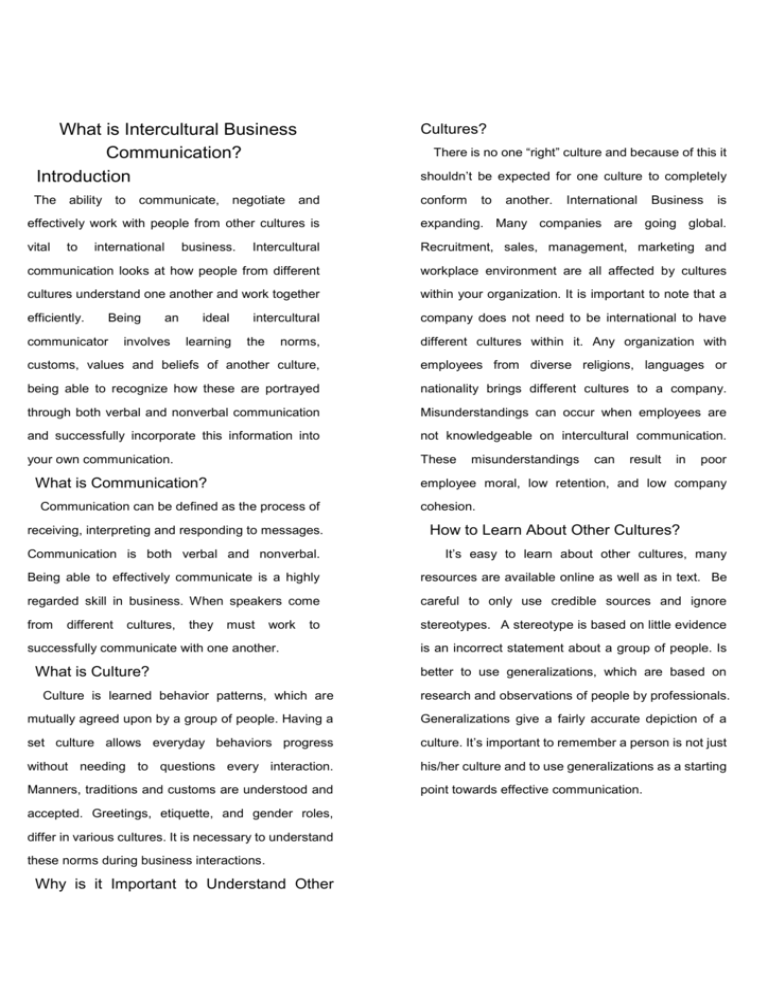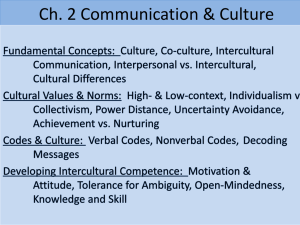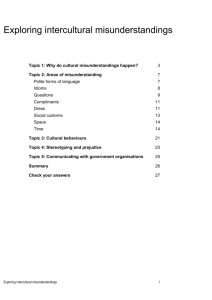ProZemi Readings (Oct 31 Fri 3)
advertisement

What is Intercultural Business Communication? Introduction The ability to communicate, negotiate Cultures? There is no one “right” culture and because of this it shouldn’t be expected for one culture to completely and conform to another. International Business is effectively work with people from other cultures is expanding. Many companies are going global. vital Intercultural Recruitment, sales, management, marketing and communication looks at how people from different workplace environment are all affected by cultures cultures understand one another and work together within your organization. It is important to note that a efficiently. company does not need to be international to have to international Being communicator an involves business. ideal learning intercultural the norms, different cultures within it. Any organization with customs, values and beliefs of another culture, employees from diverse religions, languages or being able to recognize how these are portrayed nationality brings different cultures to a company. through both verbal and nonverbal communication Misunderstandings can occur when employees are and successfully incorporate this information into not knowledgeable on intercultural communication. your own communication. These What is Communication? misunderstandings can result in poor employee moral, low retention, and low company Communication can be defined as the process of receiving, interpreting and responding to messages. cohesion. How to Learn About Other Cultures? Communication is both verbal and nonverbal. It’s easy to learn about other cultures, many Being able to effectively communicate is a highly resources are available online as well as in text. Be regarded skill in business. When speakers come careful to only use credible sources and ignore from stereotypes. A stereotype is based on little evidence different cultures, they must work to successfully communicate with one another. What is Culture? is an incorrect statement about a group of people. Is better to use generalizations, which are based on Culture is learned behavior patterns, which are research and observations of people by professionals. mutually agreed upon by a group of people. Having a Generalizations give a fairly accurate depiction of a set culture allows everyday behaviors progress culture. It’s important to remember a person is not just without needing to questions every interaction. his/her culture and to use generalizations as a starting Manners, traditions and customs are understood and point towards effective communication. accepted. Greetings, etiquette, and gender roles, differ in various cultures. It is necessary to understand these norms during business interactions. Why is it Important to Understand Other Why You Hate Your British or American Business Partner partner closes doors, damps enthusiasm, burns bridges and may damage or even destroy relationships. Thus, Is what you say what you mean, or is what you don't say they prefer to use euphemisms, a word which comes what you mean? In seminars and by coaching, my partner from the Greek, "to speak favorably." Essentially, this Nick Parry and I spend a lot of time explaining to our direct means replacing negative phrases with something more language business clients -- Germans, Swiss Germans, positive. So, "Waiter, my meal is cold" becomes, "Waiter, Austrians and Scandinavians -- why they hate us. It's my meal is not very warm." In the first example, the simple: we don't say what we mean. And we mean what we waiter would feel attacked. When we are attacked we don't say. We like to leave the interpretation of what we are have two choices: strike back or defend ourselves. This, saying to the listener. This coded speech, described as in turn, would result in the waiter saying something like, "beating around the bush," being "woolly," vague or indirect "Well, it was damn well warm when I brought it" -- which always has a deeper second meaning, which unless asked is a perfectly true statement that could create a perfectly about will be interpreted as being clearly communicated by destructive conflict that could destroy a business the person communicating. This drives literal, direct relationship. language people -- for whom "yes" means "yes" and "no" means "no" -- crazy. In the second example, however, the waiter would not Coded speech can take different forms, including humor feel attacked and would be able to apologize and reheat (often called sarcasm if you are on the receiving end), the food. Moreover, to "help" the waiter save face, he is euphemism or understatement. often pre-warned about the forthcoming bad news by the person adding the phrase "I'm afraid that..." To direct Some examples include -- language people, this could sound as weak, insincere or Communicated is: ........ Meant is: even untruthful. To indirect language people, however, it Correct me if I'm wrong ........ I'm right is a vital means to preserve a relationship by not I agree with you up to a point ........ I disagree "hurting" the other party. I hear what you're saying ........ I disagree I'll give you a call ........ I won't call Understatement is a specialty of the British but is shared I'll get back to you on it ........ No by the Chinese, Swedish, Japanese, Canadians and Hmm... interesting idea ........ Forget it many U.S. Americans. It is used to increase the effect of I'll do that ASAP ........ The hell I will a statement or to indicate modesty, but when it isn't recognized it can lead to great confusion. Why do Anglos (and most other indirect language Thus, peoples) do this? Essentially, because they believe that Communicated is: ........ Meant is: using direct language or saying "no!" to a business I've seen worse presentations ........ It was great I'm pretty much a beginner ........ I'm quite good References: I've got a bit of a problem ........ Disaster! O’Brien Browne, 2012, Why You You’re your British or I'm doing pretty good ........ I'm suicidal American Business Partner, Huffpost Business, Aug 26, I have a couple of issues here ........ We have major http://www.huffingtonpost.com/obrien-browne/why-you-hate-yo problems ur-british_b_1622416.html, Oct 26 2015 Anglos and other indirect language cultures expect Sarah Griffth, 2011, What is Intercultural Business their counterparts to be able to "read" the signals Communication?, HubPages, March 8, behind the words: gestures, body language and facial http://sarahgriffith.hubpages.com/hub/What-is-Intercultural-Bus expressions -- which means that relying on e-mail to iness-Communication, Oct 26 2015 solve misunderstandings is deadly. But because direct language cultures believe that what you say is what you mean, they focus on words, not non-verbal signals. The trouble is that their Anglo, Asian, Latino, Arab, Indian and several billion other business partners signal what they mean; they won't say it. This subtle difference can cause project delays, postponements, misunderstandings and conflicts that may wreck international partnerships in business, politics and academia -- and all because what is unsaid is of greater importance than what is said.









